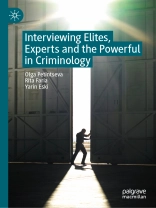This book offers practical advice on designing, conducting and analyzing interviews with ‘elite’ and ‘expert’ persons (or ‘socially prominent actors’), with a focus on criminology and criminal justice. It offers dilemmas and examples of ‘good’ and ‘bad’ practices in order to encourage readers to critically asses their own work. It also addresses methodological issues which include: access, power imbalances, getting past ‘corporate answers’, considerations of whether or not it is at times acceptable to ask leading questions and whether to enter a discussion with a respondent at all. This book will be valuable to students and scholars conducting qualitative research.
Inhaltsverzeichnis
1. Introduction.- 2. Interviewing ‘The Powerful’ In Crime And Crime Control.- 3. Interview Models And Researcher’s Self-Positioning.- 4. Their Reign, Their Game? Accessing The Powerful.- 5. Prepare, Prepare, Prepare.- 6. Conducting The Interview.- 7. Making Sense Of The Data.
Über den Autor
Olga Petintseva is Postdoctoral Research Fellow at the University of Ghent, Belgium. Her expertise is located at the intersection of criminology, migration studies and socio-linguistics.
Julie Tieberghien is Postdoctoral Research Fellow at the University of Ghent, Belgium.
Rita Faria is Assistant Professor at the School of Criminology, University of Porto, Portugal. Rita does research in white-collar crime, research misconduct and the use of qualitative methods in Criminology.
Yarin Eski is Assistant Professor at the Knowledge Hub Security and Social Resilience of the Vrije Universiteit Amsterdam, the Netherlands. He obtained his Ph D in 2015 from the University of Glasgow.












